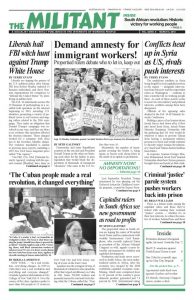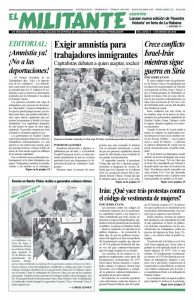NEW YORK — On Feb. 15 State Supreme Court Judge Robert Neary acquitted Sgt. Hugh Barry of murder in the killing of Deborah Danner, a 66-year-old woman suffering from schizophrenia. Once again, the decision shows the difficulty in winning a case against the cops.
Like most cops, Barry opted to be tried by the judge rather than face a jury of working people.
Barry shot Danner in her Bronx apartment Oct. 18, 2016. Neighbors had called for help when Danner began acting erratically. In the preceding two years cops had been there at least twice when she had problems. On both occasions they had broken down the door to get into the apartment.
Six cops and two emergency medical technicians responded this time. “She just wanted us to get out, to just leave,” one of the cops testified in court. “She didn’t like dealing with us.”
When Barry arrived on the scene, he took command. He testified that Danner was just outside her bedroom door when he decided to charge in and grab her. He missed her and she retreated into the bedroom. “She was too fast for me,” he told the judge. Danner was disabled and 5 feet 6 inches. Barry was half her age and 6 feet tall.
He said he rushed after her and that she took out a baseball bat, got up on her feet and placed herself in a stance to swing. He said he feared for his life so he shot her twice in the chest with the gun he already had in his hand. She died instantly. Barry had not been on the scene more than five minutes before Danner lay dead in her bedroom.
But the law says that a cop walks as long as he says he feared for his life.
Barry acknowledged Danner never swung at him. He claimed he couldn’t back off because the other five cops were blocking his way. He conceded he had not followed guidelines for dealing with mentally ill people and that he had never called for help.
Cop acquitted on all counts
Barry was indicted for murder, manslaughter and criminally negligent homicide, the first New York cop on duty to face charges like this since the killing of Amadou Diallo in 1999. He was acquitted on all counts. It took Judge Neary less than a day to reach the verdict.
“They always say that — they’re afraid, the cops do not kill. They protect the system and put the less fortunate down,” Hawa Bah, whose son Mohamed was killed by New York cops in 2012, told the Militant Feb. 16 after attending the trial. “We need justice. This is not justice.”
Hawa Bah dialed 911 for an ambulance when her son was suffering a mental breakdown. Instead of an ambulance, nine heavily armed cops arrived. They forced their way into the apartment and, claiming Mohamed Bah threatened them with a knife, shot and killed him. Then they “lost” evidence from the crime scene.
None of the cops were indicted, but Hawa Bah doggedly pursued a civil suit, and in November a federal jury ruled that the cops used excessive force in killing her son, awarding her $2.21 million.
Barry chose to be tried by the judge, who is part of the same criminal “justice” system as the cops, and much more likely to “understand” his actions. Roughly one-quarter of all people killed by cops are identified as suffering from mental illnesses. In her already agitated state, Danner certainly didn’t need six heavily armed cops crowding her into her bedroom. In a 2012 essay she wrote about living with schizophrenia she expressed concern at the police killing people with mental problems.
“We are all aware of the all too frequent news stories about mentally ill who come up against law enforcement instead of mental health professionals and end up dead,” she wrote, referring to the 1984 police killing of Eleanor Bumpurs, another New York woman with mental issues. Bumpurs “was killed by police by shotgun because she was perceived as a ‘threat to the safety’ of several grown men who were also police officers,” Danner wrote.
The Patrolmen’s Benevolent Association and other cop groups campaigned for Barry, putting a full-page ad praising him and demanding his acquittal in the New York Daily News. Every day of the trial cops took up the front row.
“I wasn’t surprised at the verdict,” Hawa Bah said. “I’ve been there. They murdered my son and after four years they told me there was not enough evidence to indict. They don’t want to indict. This goes on and on and on. They don’t care about justice.
“We just have to keep fighting. Never give up.”
Danner’s relatives are pursuing a federal lawsuit to hold the city responsible for her killing.

